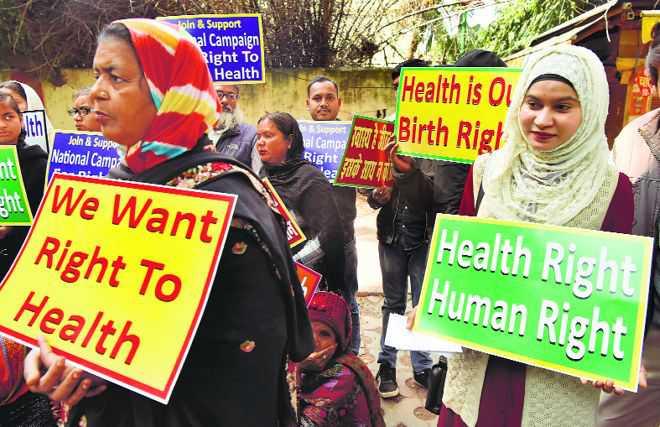
Goal: There is a need to reduce the role of hospitals and doctors by at least 70-80 per cent, which is possible through health education.
Dr R Kumar
President, Society for Promotion of Ethical and Affordable healthCare
EXPENDITURE on medical treatment is growing at an unsustainable rate in India. Policy-makers are increasingly seeking ways to reduce wasteful spend. Rushing to the doctor/hospital over minor problems arising out of an unhealthy lifestyle, such as sleeplessness, dehydration and malnutrition, is a common sight. Diagnostic tests are unnecessarily prescribed for such ‘patients’, followed by administering pills that are costly and possibly harmful. In some cases, surgical interventions that may be avoidable, risky and unproductive are carried out. The extravagance can also include spending on services that lack evidence of producing better health outcomes, as compared to less expensive alternatives or plain counselling. When two approaches offer identical benefits but have very different costs, the case for steering patients to the cheaper alternative is made out — for example, using quality generic medicines instead of branded drugs.
The situation gets complicated due to inefficiencies in the provision of healthcare goods and services, besides costs incurred while dealing with medical lapses such as preventable infections in hospitals, and aggressive interventions to save the patient’s life.
There is a dire need for evaluating unnecessary expenditure, implementing waste-reduction strategies and reducing the monetary burden of patient care. Wasteful spend constitutes about half of all expenditure on medical treatment. Can India afford the luxury of money-guzzling healthcare? Can schemes like Ayushman Bharat succeed in the face of unethical exploitation of scarce national resources?
India spends about 1 per cent of its GDP on healthcare, far less than the US (18%). The latter is still unable to cope with its medicare demands. Estimates show a wastage of $992 billion or 37 per cent of the $2.6 trillion annual total spend on patient care in the US. Such expenditure is also due to ‘overtreatment’ to guard against malpractice lawsuits. Then there is the case of using potent medicines when none are required — for instance, antibiotics for viral fever or common cold and cough. Such abuse of antibiotics or other medicines is not only unnecessary, but it also enhances the cost and jeopardises health. Another example is continued chemotherapy treatment for patients with cancer at an advanced stage. Such treatment can cost lakhs of rupees, but may extend a patient’s life by only a few weeks.
Many patients have physical symptoms that are not explained by any disease. The underlying cause may be depression, anxiety, financial loss or marital discord. Nevertheless, these patients often demand — and receive — extensive examination and treatment, which is usually attributed to pressure to ‘do something’ via the medicinal route. Ideally, only explaining and counselling could suffice in most of such cases. However, there is a tendency to visit hospitals for every little complaint, which may be self-limiting or require only a lifestyle rejig. People forget that hospitals are not health resorts. There is a need to reduce the role of hospitals and doctors by 70-80 per cent, which is possible through health education. Setting up a large number of medical institutes (AIIMS) at huge costs but with poor infrastructure and shortage of trained manpower will not only be wasteful, but also counter-productive. Making the community aware about the hazards of ‘overtreatment’ and teaching medical students and doctors about the importance of delivery of high-quality but low-cost care can go a long way in economising on medical bills. The ‘fee for service’ model and the greed of hospitals, pharmaceutical houses, medical device suppliers and other stakeholders to earn higher profits are worrisome trends. Pressure groups trying to extract their pound of flesh from Ayushman Bharat packages are a living example of working for profit rather than service.
Splurging on ‘attractive’ healthcare packages or popping pills every day under the misconception that these are necessary to remain healthy bear testimony to our recklessness. Doctors routinely order electrocardiogram and other tests for people who don’t need them. Some women get cervical cancer testing done annually, even though it is recommended every 3-5 years. Unfortunately, the medical system is plagued by the lure of cash incentives for prescribing or conducting tests and procedures. Patients often insist that a medical service provider must write a prescription or perform a test and not merely deliver a ‘lecture’ on health education. This mindset has contributed to the abuse of scanty medical resources. Considering our growing population, this approach needs a paradigm shift.
Once you are labelled a ‘patient’, it is difficult to shed the tag, unless a good doctor tries to restore normalcy. India has to raise a workforce of such doctors, since we cannot afford to waste money and resources on avoidable medical treatment.



























